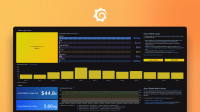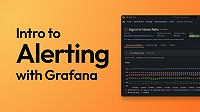Caution
Grafana Alloy is the new name for our distribution of the OTel collector. Grafana Agent has been deprecated and is in Long-Term Support (LTS) through October 31, 2025. Grafana Agent will reach an End-of-Life (EOL) on November 1, 2025. Read more about why we recommend migrating to Grafana Alloy.
Important: This documentation is about an older version. It's relevant only to the release noted, many of the features and functions have been updated or replaced. Please view the current version.
tracing block
tracing is an optional configuration block used to customize how Grafana Agent
produces traces. tracing is specified without a label and can only be provided
once per configuration file.
Example
tracing {
sampling_fraction = 0.1
write_to = [otelcol.exporter.otlp.tempo.input]
}
otelcol.exporter.otlp "tempo" {
// Send traces to a locally running Tempo without TLS enabled.
client {
endpoint = env("TEMPO_OTLP_ENDPOINT")
tls {
insecure = true
}
}
}Arguments
The following arguments are supported:
| Name | Type | Description | Default | Required |
|---|---|---|---|---|
sampling_fraction | number | Fraction of traces to keep. | 0.1 | no |
write_to | list(otelcol.Consumer) | Inputs from otelcol components to send traces to. | [] | no |
The write_to argument controls which components to send traces to for
processing. The elements in the array can be any otelcol component that
accept traces, including processors and exporters. When write_to is set
to an empty array [], all traces are dropped.
NOTE: Any traces generated before the
tracingblock has been evaluated, such as at the early start of the process’ lifetime, are dropped.
The sampling_fraction argument controls what percentage of generated traces
should be sent to the consumers specified by write_to. When set to 1 or
greater, 100% of traces are kept. When set to 0 or lower, 0% of traces are
kept.
Blocks
The following blocks are supported inside the definition of tracing:
| Hierarchy | Block | Description | Required |
|---|---|---|---|
| sampler | sampler | Define custom sampling on top of the base sampling fraction. | no |
| sampler > jaeger_remote | jaeger_remote | Retrieve sampling information via a Jaeger remote sampler. | no |
The > symbol indicates deeper levels of nesting. For example, sampler > jaeger_remote refers to a jaeger_remote block defined inside an sampler
block.
sampler block
The sampler block contains a definition of a custom sampler to use. The
sampler block supports no arguments and is controlled fully through inner
blocks.
It is invalid to define more than one sampler to use in the sampler block.
jaeger_remote block
The jaeger_remote block configures the retrieval of sampling information
through a remote server that exposes Jaeger sampling strategies.
| Name | Type | Description | Default | Required |
|---|---|---|---|---|
url | string | URL to retrieve sampling strategies from. | "http://127.0.0.1:5778/sampling" | no |
max_operations | number | Limit number of operations which can have custom sampling. | 256 | no |
refresh_interval | duration | Frequency to poll the URL for new sampling strategies. | "1m" | no |
The remote sampling strategies are retrieved from the URL specified by the
url argument, and polled for updates on a timer. The frequency for how often
polling occurs is controlled by the refresh_interval argument.
Requests to the remote sampling strategies server are made through an HTTP
GET request to the configured url argument. A service=grafana-agent query
parameter is always added to the URL to allow the server to respond with
service-specific strategies. The HTTP response body is read as JSON matching
the schema specified by Jaeger’s strategies.json file.
The max_operations limits the amount of custom span names that can have
custom sampling rules. If the remote sampling strategy exceeds the limit,
sampling decisions fall back to the default sampler.



